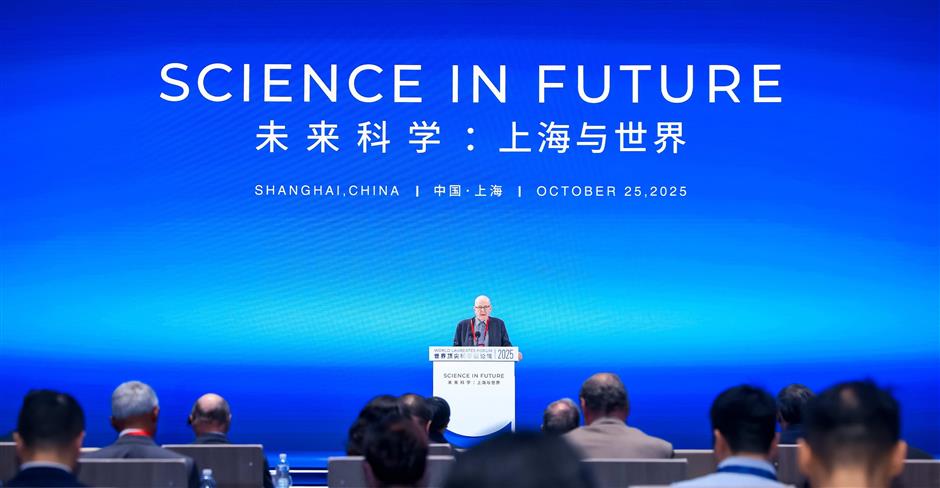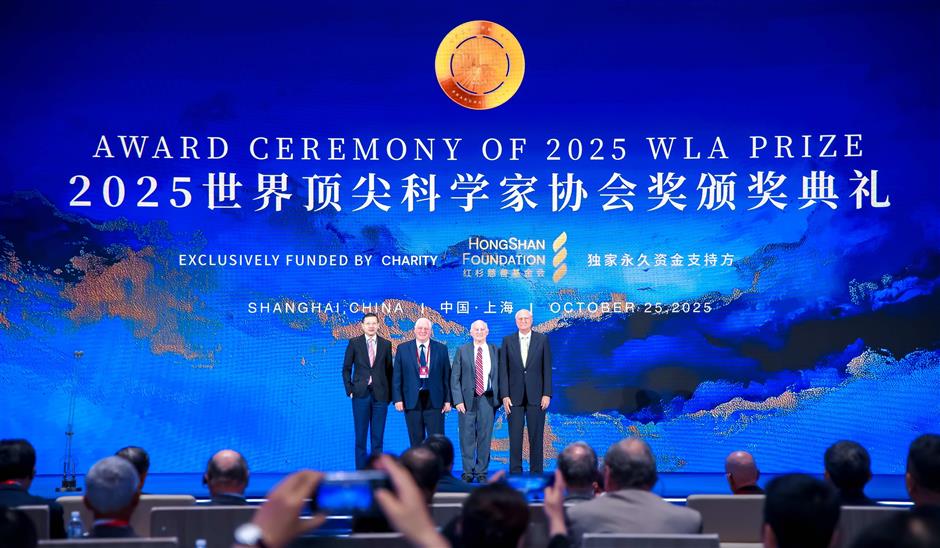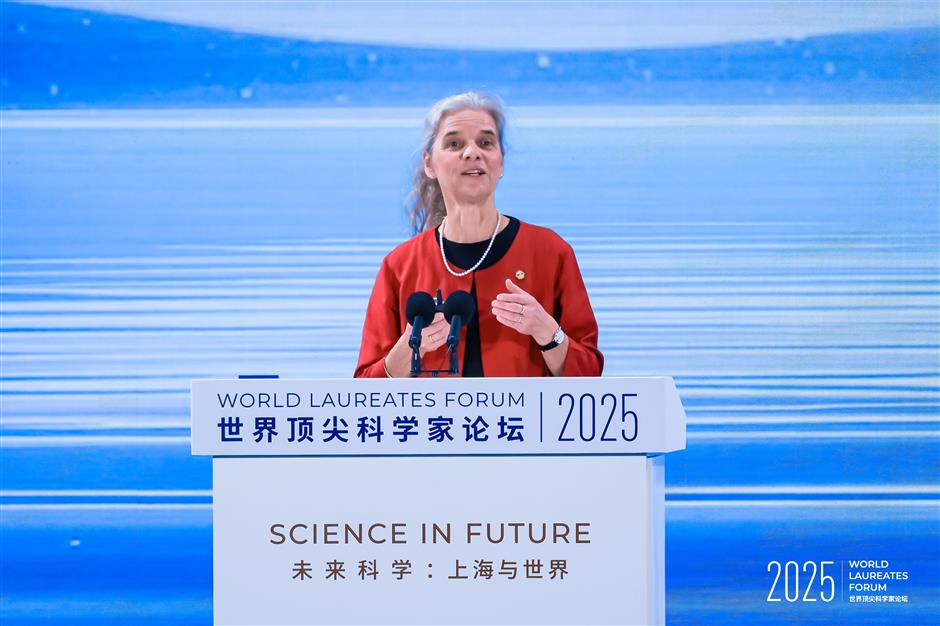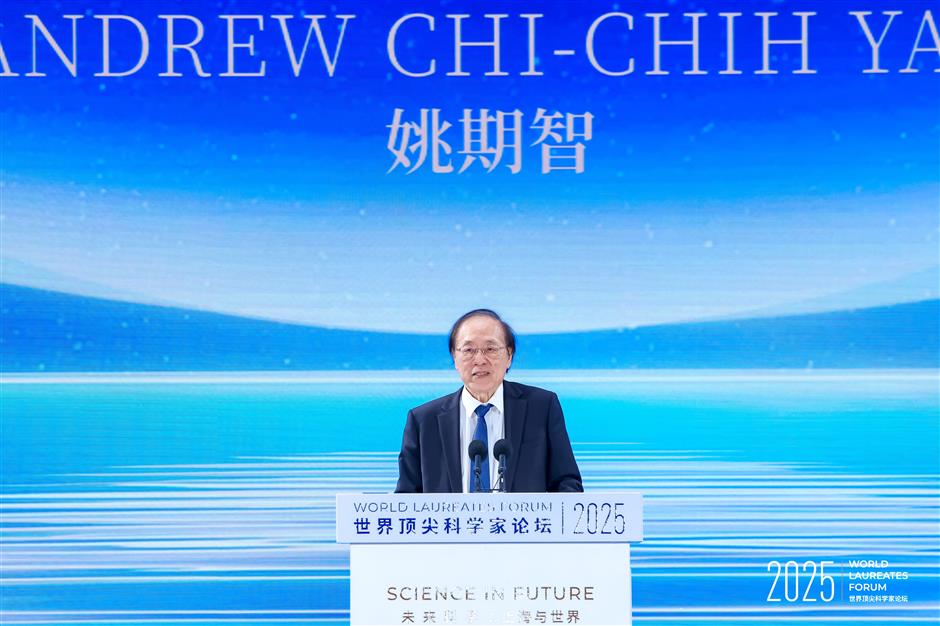
政府新闻
科学始于好奇:2025年世界获奖者论坛在上海开幕 2025-10-27

K. Barry Sharpless, 2001 and 2022 Nobel chemistry laureate, delivers opening remarks at the 2025 World Laureates Forum last Saturday in Shanghai's Lingang Special Area.
The 2025 World Laureates Forum kicked off last Saturday in Shanghai, bringing together more than 150 top scientists from around the world to discuss advances in artificial intelligence, quantum technology and life sciences.
Richard Schoen from Stanford University was awarded the WLA Prize for Intelligent Science or Mathematics, while Scott D. Emr with Cornell University and Wesley I. Sundquist from the University of Utah took home the WLA Prize for Life Science or Medicine.
Schoen, known for his pioneering work in geometric analysis and the positive-mass theorem in general relativity, was introduced by his former PhD adviser, mathematician Shing-Tung Yau, who described their collaboration as "a moment when mathematics revealed the structure of nature."
Presenting the life science award, Nobel laureate Randy Schekman said Emr and Sundquist uncovered how cells manage membrane proteins and how HIV hijacks that process to replicate. Their findings have since informed the development of new antiviral strategies.
Sundquist said their early work helped lay the groundwork for Lenacapavir, a long-acting drug now approved for HIV prevention.
"Curiosity-driven science eventually changes the real world," he said.
Emr added that the two labs have shared data and ideas for more than 25 years. "That spirit of trust and exchange makes complex problems solvable," he noted.

(From left) Neil Shen, founding and managing partner of HongShan Foundation, and 2025 WLA Prize winners Scott D. Emr, Wesley I. Sundquist and Richard Schoen pose for a photo during the awards ceremony.
Curiosity at the core of discovery
Karolin Luger, 2023 WLA Prize laureate in life science, opened her talk with a vivid metaphor: "Imagine fitting a 10-kilometer-long sewing thread into a tiny compartment without tangling it."
It was her way of explaining how DNA, if stretched out, would span kilometers, yet fits perfectly inside each cell by wrapping around tiny spool-like proteins called histones.
She found that histones, once thought to exist only in complex organisms, are part of an ancient system that all forms of life still use to pack and protect their DNA.
"Almost every major discovery in biology begins with curiosity," Luger said. "If the result were predictable, it wouldn't be worth doing."
Nobel physics laureate Serge Haroche reflected on a century of quantum science in his talk "The Second Quantum Revolution." He traced its evolution from atom-photon interactions and controllable entanglement to today's breakthroughs in quantum communication, metrology and computing.
"When quantum theory first emerged, no one knew what it could be used for," Haroche said. "Yet decades later, it enabled atomic clocks, precision measurement, and secure communication."
He called for continued support for basic research and open collaboration, warning against hype and geopolitical barriers.
"The greatest surprises come from imagination and curiosity," he concluded.

Karolin Luger delivers a speech at the 2025 World Laureates Forum.
Computation at the core of future science
Andrew Chi-Chih Yao, who won the 2000 Turing Award, said breakthroughs in AI, biotech and quantum computing are changing how we think about security.
He warned that with DNA synthesis now easier than ever, labs can build viruses from scratch, making stronger biosecurity rules urgently needed.
Yao also noted that large language models can sometimes act in deceptive or unpredictable ways, showing why AI safety should be treated as part of cybersecurity.
He said future digital security will depend on working across disciplines and using verifiable algorithms – tools that can confirm results without exposing private data. Quantum communication, he added, could open new ways to verify identity and location online.
Jack Dongarra, the 2021 Turing Award laureate, described computational science as the "third pillar of discovery," alongside theory and experiment, enabling scientists to simulate complex phenomena from climate change to materials design.
He noted that El Capitan, the world's fastest supercomputer, can perform more than a quintillion calculations per second, something that would take a regular laptop years to finish. It shows how such machines are vastly expanding what science can explore through computation.
Nobel chemistry laureate Michael Levitt said the World Laureates Forum has become a platform where scientists across generations and disciplines can share ideas freely, noting that "science advances when we dare to ask questions and share what we discover with the world."

Turing Award laureate Andrew Chi-Chih Yao speaks on AI security at the 2025 World Laureates Forum in Shanghai.
Source: Shanghai Daily

